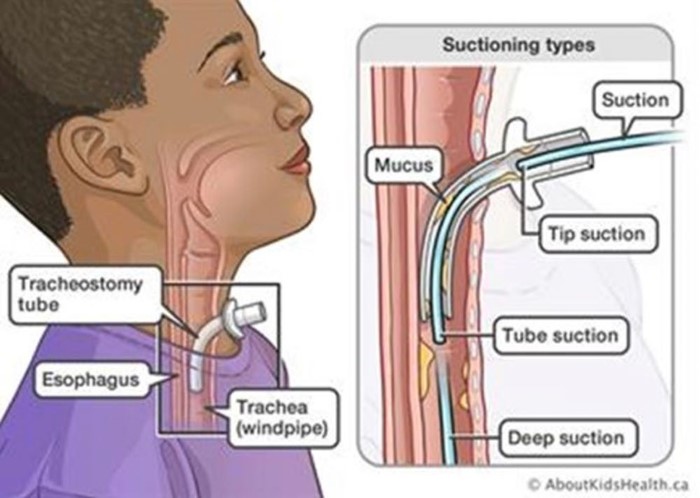In caring for a client who requires seizure precautions, the practical nurse (PN) should ensure the ready availability of equipment to perform which procedure?
Suction the trachea.
Insert a urinary catheter.
Apply soft restraints.
Insert a nasogastric tube.
The Correct Answer is A
- Seizure precautions are measures taken to protect a client who is at risk of having a seizure, which is a sudden and abnormal electrical activity in the brain that can cause changes in behavior, movement, sensation, or consciousness. Seizure precautions include providing a safe environment, monitoring the client's vital signs and neurological status, administering anticonvulsant medications, and documenting the onset, duration, and characteristics of any seizure activity.
- One of the potential complications of a seizure is aspiration, which is the inhalation of foreign material into the lungs, such as saliva, vomit, or food. Aspiration can cause choking, pneumonia, or respiratory distress. To prevent or treat aspiration, the practical nurse (PN) should ensure the ready availability of equipment to perform suctioning of the trachea, which is the tube that connects the mouth and nose to the lungs. Suctioning of the trachea involves inserting a catheter through the nose or mouth into the trachea and applying negative pressure to remove any secretions or debris from the airway.
- Therefore, option A is the correct answer, while options B, C, and D are incorrect.
Option B is incorrect because inserting a urinary catheter is not related to seizure precautions or aspiration prevention.
Option C is incorrect because applying soft restraints may not be necessary or appropriate for a client who requires seizure precautions, as they may interfere with the natural movements of the seizure or cause injury to the client.
Option D is incorrect because inserting a nasogastric tube is not related to seizure precautions or aspiration prevention.

Nursing Test Bank
Naxlex Comprehensive Predictor Exams
Related Questions
Correct Answer is D
Explanation
A. Flexing the client's neck forward can increase intracranial pressure by impeding venous drainage from the brain and increasing cerebral blood volume. Therefore, this choice is incorrect.
B. Grouping several nursing activities to be completed at one time can increase intracranial pressure by stimulating the client and causing fluctuations in blood pressure and heart rate. Therefore, this choice is incorrect.
C. Limiting suctioning the client's airway to 30 seconds at a time can reduce intracranial pressure by minimizing hypoxia and hypercarbia, which can cause cerebral vasodilation and increased cerebral blood volume. However, this intervention alone is not sufficient to prevent increased intracranial pressure, and suctioning should be done only when necessary and with caution. Therefore, this choice is partially correct but not the best answer.
D. Placing the client in a quiet environment can reduce intracranial pressure by minimizing sensory stimulation and promoting relaxation, which can lower blood pressure and heart rate and decrease cerebral metabolic demand. Therefore, this choice is correct and the best answer.
Correct Answer is ["A","B","C","D","E"]
Explanation
Extremity pulse +3, Capillary refill 2 seconds, Right extremity is warm to the touch, Adolescent reports no numbness or tingling, Adolescent reports pain as 2 on a scale of 0 to 10.
Whether you are a student looking to ace your exams or a practicing nurse seeking to enhance your expertise , our nursing education contents will empower you with the confidence and competence to make a difference in the lives of patients and become a respected leader in the healthcare field.
Visit Naxlex, invest in your future and unlock endless possibilities with our unparalleled nursing education contents today
Report Wrong Answer on the Current Question
Do you disagree with the answer? If yes, what is your expected answer? Explain.
Kindly be descriptive with the issue you are facing.
